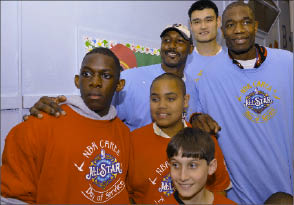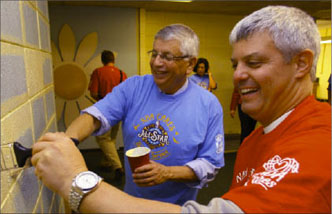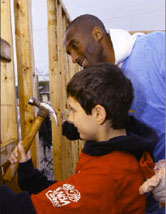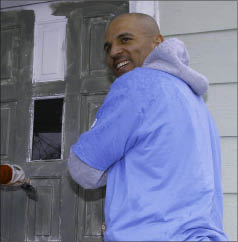


![]()
ONLINE
NBA Cares
Editors’ Note
Prior to assuming her current post in April 2005, Kathleen Behrens joined the National Basketball Association (NBA) in 2000 as Vice President, Community Relations, where she oversaw all of the NBA’s global philanthropic and public service initiatives. Before this, in 1995, Behrens was at New York Cares, where, for six years, she served as Executive Director. Behrens graduated from the University of Hartford and began her career in politics, serving in the administration of former New York Governor Mario Cuomo.
During his eight-year tenure with the NBA, Mark Tatum has held several positions, including Vice President of Business Development, Senior Director and Group Manager of Marketing Properties, and Director of Marketing Partnerships. Prior to joining the NBA in 1999, Tatum worked for Major League Baseball in its Corporate Sponsorship and Marketing Department. Tatum also previously worked in various sales and marketing capacities for the Clorox Company, Pepsi-Cola Company, and Procter and Gamble. Tatum is a graduate of the Harvard Business School and received a BS from Cornell University .
Company Brief
Founded in 1946, the National Basketball Association (www.nba.com) is the world’s premier basketball league. Headquartered in New York, the NBA has 30 teams divided into the Eastern and Western conferences. The NBA launched NBA Cares in October 2005, which, through the teams, current and former players, and league office, has committed to donating $100 million to charity, providing a million hours of hands-on service to the community, and creating 250 places where kids and families can live, learn, or play.
Can you give an overview of how NBA Cares is doing?
Behrens: Almost two and a half years after we launched NBA Cares, it is now bigger and more important than it has ever been. Our partners are joining us here and abroad, both with our events and in the planning and execution of our projects. Our players are responding to the opportunities that the program provides for them to engage in their communities, to enhance the work of their own foundations, and to work with their teams. And we continue to work with some of what we think are the best nonprofit and nongovernmental organizations in the world.
As you look at how the work has evolved, has it been critical to build those partnerships?
Behrens: Yes, the partnerships for us are really where things happen. We believe that the strengths of our nonprofit and community partners are what allow us, as well as our teams, our players, and our business partners, to have the most impact. They’re the ones who need the resources, attention, and manpower that we provide, because that’s how they thrive. What we really tried to do with NBA Cares was to work with a good variety of organizations that are dealing with health-related causes, education, or youth and family development. We have so many opportunities to have an impact in our communities and allow our partners to leverage their assets.
When it comes to NBA Cares’ work with some of your partnerships, do you see that these partnerships are continuing to grow? Do they need to grow to fulfill the need that is out there?
Behrens: Very much. Every partner that we talk to, and we work very closely with Mark’s group on this, leverages our strengths. It’s all about how we can work together not only on the business side, but on the community side as well.
Tatum: And we’re seeing more season-long efforts.
As the leader of the marketing partnership part of the business for the NBA, can you give an overview of that role and the significance of those marketing partners in general, as well as with respect to NBA Cares?
Tatum: We work with some of the best marketing companies in the world, like Toyota, T-Mobile, FedEx, Coca-Cola, and Adidas, and they are partnering with us to promote the game of basketball all over the world. The wonderful thing about these partners is that they all have a commitment to giving back and to partnering with us on initiatives like NBA Cares. Every single one of our marketing partners, our television partners, several other promotional partners, and our licensees all contributed to NBA Cares throughout All-Star weekend.
How critical do you feel it was to have the recent All-Star Game in New Orleans? How involved was NBA Cares throughout the weekend?
Behrens: The weekend was very much about NBA Cares, particularly because the Hornets returned to New Orleans on a full-time basis this season. We knew that progress in that city was slow, but the city is up and running, and it is a great town. We had a terrific time, and the service and hospitality could not have been better. But there are still communities that are struggling to provide places where kids and families can live, learn, or play. So our commitment was to try and provide that, and our partners and players responded with great enthusiasm. It was very much an NBA Cares celebration, as well as a celebration of a great American city.
Can you take us through some of the programs you put in place at All-Star weekend and how the weekend played out?
Behrens: At every All-Star weekend, we work with our partners, our teams, and our players to give back to the community. We see the All-Star weekend not just as the celebration of the game, but also as a demonstration of our commitment to social responsibility. We did reading rallies and clinics, dedicated basketball courts, and held our wheelchair clinic and game for young kids. We also had more than 2,500 volunteers out in various parts of the city. We built playgrounds, we built homes, and we helped renovate and revitalize a number of public schools, which are dealing not only with the transition since the hurricane, but also with families that are still displaced and students who are still struggling. So being able to go in there and create brighter places for the kids and the teachers meant a great deal to the community.
You brought so much attention to New Orleans that weekend, but the weekend ended and everybody went back to his or her business. Is it important for you, with your partners, to have an effect after the weekend ends?
Behrens: Absolutely. Our commitment to New Orleans was not just about the All-Star Game, but also is season-long and league-wide, and we have additional events happening there with our teams and our players. Also, in terms of our partnerships, because we’re working with organizations that are there on the ground and that are working day in and day out, we continue to support them and ensure that their work is able to continue.

Every year, NBA staff and players participate in a series of service projects in the nearby community during All-Star Weekend. Above: Stars Dikembe Mutombo and Yao Ming with young supporters
As NBA Cares has made its impact over these years, the players not only have responded, but also have truly become engaged. What do you think has contributed to their enthusiasm to get involved?
Behrens: We have so many different kinds of opportunities for them, and they can see the impact that they’re having. The commitment on the part of our players, both current and former, and from the WNBA, has been extraordinary, and it’s a credit to the kind of people that they are. They understand that basketball is a great platform for them and that being in the NBA is a great opportunity to give back in a meaningful way to the community.
Sometimes the public doesn’t have a great understanding of how much time and effort your players give to these projects. Is it important for you to build awareness around this, or is it really more about the work?
Behrens: The most important thing is the work, but the final piece in getting the work done is being able to tell people about it; not only because it’s important, but also because we want people to know about the great community organizations that we work with. We also believe that by telling the story and showing our players out there in the community, we can inspire other people to look for ways that they can make a difference in their own lives or with their own businesses.


NBA commissioner David Stern, David Levy of Turner Sports,
and star Kobe Bryant help restore New Orleans with the help of local fans in 2007.
Corporate leaders at all top companies are placing a major focus on corporate responsibility and community engagement. Do you see the expectation from your partners that the NBA does this type of work?
Behrens: Definitely. I think our partners have responded the same way our players have. NBA Cares has established itself in a short time as a program that people want to participate in, because they see how genuine it is and the kind of impact that it’s having. But at the same time, all of our business partners believe in corporate social responsibility. So it’s a natural connection for us each to leverage the social responsibility programs that we have. Together we’ve been able to have even more of an impact than we would have separately.

Jason Kidd restores a local’s front door.
How critical is it for NBA Cares to have engagement at the NBA level from the top down? Has it been important to your efforts, Kathy, to making this a success and to being able to have the tools you need?
Behrens: Very much. NBA Commissioner David Stern believes in this fervently. And it is very much a part of the NBA culture. Part of what NBA Cares is about is the entire NBA family. In addition to all of our All-Stars and our great legends of the game, we have players’ mothers and wives, and we have our employees from teams, the league, the Players Association, and our business partners. So it’s everybody. When we say NBA Cares, what we really mean is that the entire NBA cares, and we not only care in a sort of emotional sense but are ready to care and work in a physical sense as well.
You both have been at the NBA for some time. You have teams around you who know you well. Kathy, if I asked some of these people what it was like to work with and for you, what do you think they’d say?
Behrens: Working at the NBA, we have a vision that we follow, which is David Stern’s. He is the person who pushes us on this stuff. Our objective is to carry out that vision and then deliver it in such a way that makes everybody who’s associated with the NBA proud. At the end though, it’s not about any one individual, and I think David would say the same thing. It’s about recognizing the power of the NBA and what we can all do when we work with our partners, our players, our teams, and our employees.
Mark, you came to the NBA after working at Major League Baseball. What excited you about the opportunity? Now looking back, has it been what you expected?
Tatum: What excited me about the opportunity was the global nature of the NBA. I always viewed the NBA as the best-marketed league out there, and it certainly has been the case. The people here have been terrific, and we have an unbelievable leader in the Commissioner. He sets this vision for us, and people are aligned behind that vision.